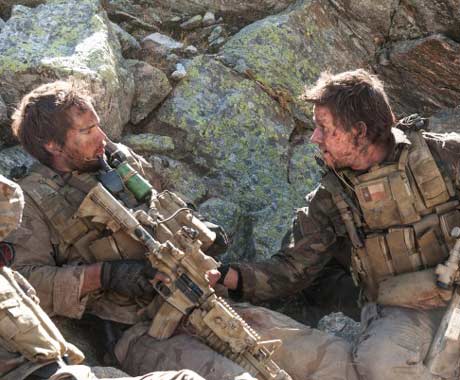Opening with a lengthy montage of documentary footage of the gruelling training undergone by Navy SEALS recruits, Lone Survivor announces early, and often, that it is to be a war film grounded in "reality". Based on the book of the same name by Marcus Luttrell, a soldier who got caught along with three of his comrades in an impossible fight against scores of Taliban insurgents on a steep mountainside in 2005, this is a big movie about a small story. Like so many war films before it, this is a movie about sacrifice, about honour, about bravery, and, ultimately, about the will to survive, but not much else. Short on character development, meaningful dialogue, and political context, Lone Survivor amounts to a two-hour bludgeoning before offering up an anti-climactic "reveal" spoiled by its very title.
Detailing the messy failure of Operation Red Wings, a minor, but costly, event in the recent war in Afghanistan, Peter Berg's deeply reverent film is a relentless, ultra-violent portrait of courage under fire. Dropped into hostile territory on a mission to assassinate a Taliban commander, four grizzled veteran SEALS (Mark Wahlberg, Taylor Kitsch, Emile Hirsch, Ben Foster) accidentally come across an elderly goatherd and his two adolescent sons. Suddenly, they are faced with a crucial dilemma: Do they let them go, even though they are likely to report the Americans' position to the Taliban? Or do they kill them, illegally, and carry out their mission? Berg allows us a moment to reflect on this horrific, but realistic, ethical test, before the soldiers choose the former option, demonstrating their moral integrity, and sealing their fates. "Look at his face," laments Foster's character, pointing at a teenaged captive. "That's death." Within hours, waves of Taliban soldiers sweep down the mountain, peppering the doomed Americans with bullets, shrapnel, and explosives. The SEALS fight valiantly, but they never have a chance. Sample dialogue: "I'm shot." "Everyone's shot. Can you fight?"
Throughout, Berg (Battleship, Friday Night Lights) keeps his handheld camera tight to the Americans' faces, rendering the endless battle claustrophobic, chaotic, terrifyingly disorienting. If only this documentary aesthetic were carried through every aspect of the film, Lone Survivor might have been a kind of masterpiece. Instead, Berg overreaches, stylizing each successive American death, aiming for glorification but, ultimately, popping the "reality" bubble and taking us out of the film.
Action-heavy and relying on gutsy, compelling performances in the lead roles, Lone Survivor is, like Black Hawk Down before it, at once a rah-rah recruitment video and a sickening, wrenching portrait of death and dismemberment on the battlefield. Berg wants us to see these men as heroes — indeed, the closing montage of photos of the real-life soldiers rolls under a plaintive cover of David Bowie's classic song — but we will also see them as torn, bullet-ridden, blood-soaked flesh. This is Hamburger Hill by way of Passion of the Christ: a film about the extraordinary bravery of American fighting men and their willingness to win no matter the cost, but a film obsessed with revelling in the endless agonies they suffer before finally being sacrificed, ostensibly for us. I left the film rattled, edgy, and empty.
(eOne)Detailing the messy failure of Operation Red Wings, a minor, but costly, event in the recent war in Afghanistan, Peter Berg's deeply reverent film is a relentless, ultra-violent portrait of courage under fire. Dropped into hostile territory on a mission to assassinate a Taliban commander, four grizzled veteran SEALS (Mark Wahlberg, Taylor Kitsch, Emile Hirsch, Ben Foster) accidentally come across an elderly goatherd and his two adolescent sons. Suddenly, they are faced with a crucial dilemma: Do they let them go, even though they are likely to report the Americans' position to the Taliban? Or do they kill them, illegally, and carry out their mission? Berg allows us a moment to reflect on this horrific, but realistic, ethical test, before the soldiers choose the former option, demonstrating their moral integrity, and sealing their fates. "Look at his face," laments Foster's character, pointing at a teenaged captive. "That's death." Within hours, waves of Taliban soldiers sweep down the mountain, peppering the doomed Americans with bullets, shrapnel, and explosives. The SEALS fight valiantly, but they never have a chance. Sample dialogue: "I'm shot." "Everyone's shot. Can you fight?"
Throughout, Berg (Battleship, Friday Night Lights) keeps his handheld camera tight to the Americans' faces, rendering the endless battle claustrophobic, chaotic, terrifyingly disorienting. If only this documentary aesthetic were carried through every aspect of the film, Lone Survivor might have been a kind of masterpiece. Instead, Berg overreaches, stylizing each successive American death, aiming for glorification but, ultimately, popping the "reality" bubble and taking us out of the film.
Action-heavy and relying on gutsy, compelling performances in the lead roles, Lone Survivor is, like Black Hawk Down before it, at once a rah-rah recruitment video and a sickening, wrenching portrait of death and dismemberment on the battlefield. Berg wants us to see these men as heroes — indeed, the closing montage of photos of the real-life soldiers rolls under a plaintive cover of David Bowie's classic song — but we will also see them as torn, bullet-ridden, blood-soaked flesh. This is Hamburger Hill by way of Passion of the Christ: a film about the extraordinary bravery of American fighting men and their willingness to win no matter the cost, but a film obsessed with revelling in the endless agonies they suffer before finally being sacrificed, ostensibly for us. I left the film rattled, edgy, and empty.
